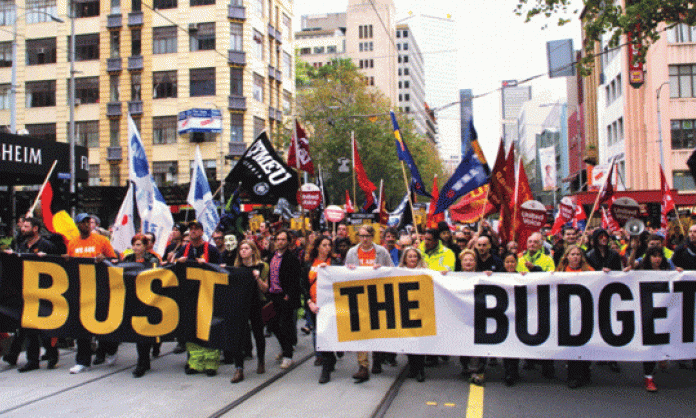In his election night victory speech in September last year, Tony Abbott said, “In three years’ time, the carbon tax will be gone, the boats will be stopped, the budget will be on track for a believable surplus and the roads of the 21st century will finally be well under way.”
He failed to predict that tens of thousands of people would take to the streets against him within six months, that he would lead one of the most unpopular first year governments in the post-WWII era and that within 15 months almost every right wing columnist in Australia would be condemning him.
The Liberals have attempted to open up a new and aggressive chapter in the long running campaign to roll back the post-WWII gains of the workers’ movement. The much reviled and now hopelessly stalled class war budget was the centrepiece of this assault.
But just as Liberal prime minister John Howard found with WorkChoices in 2005, a full frontal attack on the living standards of workers is a risky strategy in a society in which there remains widespread support for public spending and contempt for policies that unashamedly benefit the rich at the expense of the poor.
The legacy of Australian neoliberalism
Neoliberalism has been hugely successful in Australia – resulting in a massive transfer of wealth from workers to bosses, extensive privatisation of public assets and increasingly pro-business spending and tax policies. But, importantly, it was introduced under Labor governments with the backing of unions and the left.
In stark contrast to the experience of the UK under Thatcher or Reagan in the US, neoliberal measures were not imposed in Australia by winning a critical mass of the population to a vision of an individualised, free market, big business-dominated utopia, but on the basis of promises about rising living standards, unions securing a role in governance and improved services (the “social wage”).
It is this legacy that the Liberals are struggling to overcome. Joe Hockey’s anguish at the “age of entitlement” and Abbott’s failure to generate support for the budget or concern about the deficit are due largely to the persistence of the idea that that society should provide for people when they are sick, unemployed, have young children or want an education.
Australia has more than 30 years’ experience of privatisation and economic restructuring. Today the cost of living is increasing more rapidly than in any other OECD country, and just 14 percent of people feel positive about their future economic situation. Yet CEO pay and banking and mining industry profits are soaring. Any government selling austerity is in for trouble.
Abbott predictably turned to the classic last resort of scoundrel governments: whipping up racism. He was able to change the focus of Australian politics for a time by rounding up innocent Muslims in the middle of the night with a compliant media in tow, seizing plastic swords and creating social panic about home-grown jihadis. But there were limits to this strategy.
The polls improved only temporarily. Abbott’s failure to put forward a long term vision around which to rally his supporters meant that, as soon as attention returned to bread-and-butter domestic issues, the government’s support headed south again.
An opportunity squandered
The greatest source of stability for the Abbott government is the weakness of our side. Union density is at the lowest point since records began more than 100 years ago, and the level of industrial action has collapsed from 191 days on strike annually per thousand workers 20 years ago to just eight days in the year to June 2014.
Added to this, the union leadership has a long established passivity that has demoralised and depoliticised those who might have otherwise been prepared to fight.
Nowhere were the consequences of this so clearly demonstrated as in relation to the budget response.
The potential that existed to build a serious campaign was illustrated by the impressive March in March protests, which mobilised tens of thousands of people around the country in anticipation of atrocities the Abbott government was likely to commit.
Had the unions and the ALP been prepared to throw their organisational weight behind the hugely popular anti-budget campaign and motivate their supporters to take action on the streets and in workplaces, there was potential to create a major crisis for the government. Instead, the familiar pattern of short-lived outrage collapsing into resentful resignation was repeated.
It is therefore up to those who recognise the need for a fightback – a class war to match that of Abbott – to start building it. This starts with arming our side with the arguments that can present an alternative to the passive class collaboration of the current union leaders and ALP, and building the sorts of organisations that we will need to counter those of the bosses and their representatives in parliament.
Muscles that are not used atrophy, but they can be strengthened again. The current weakness of our side belies the fact that the working class still has the power to bring the economy to a standstill, stop the flow of profits to the bosses, create a crisis for the government and put the needs of the majority front and centre in all political calculations.
We need to build renewed opposition as Abbott battles his way through the rest of his first term.









